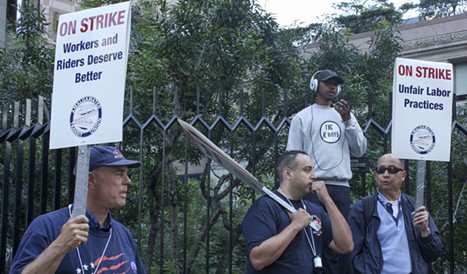Business and political leaders are urging a speedy resolution to the BART strike tonight as negotiations between Bay Area Rapid Transit (BART) and Amalgamated Transit Union Local 1555 and Service Employees International Union (SEIU) Local 1021 resume at 6pm.
The strike, in effect since Monday, came about after BART’s labor contracts expired on Sunday night and the agency refused to “bargain in good faith,” says Leah Berlanga, chief negotiating officer for SEIU 1021, over a new contract with the unions. The resumption in negotiations was sparked by Gov. Jerry Brown, who tasked his two top mediators with helping resolve the dispute.
The loss of BART service, which on average shuttles 400,000 weekday passengers, is projected by the Bay Area Council to cost the regional economy $73 million a day in lost productivity. The San Francisco Chamber of Commerce also expects additional economic impacts on the meals and goods bought daily by commuters who are not commuting during these strikes. To make matters worse, the strike hit the city in the runup to the July 4th weekend.
“The strike is also expected to have an effect on holiday traffic,” Gwen Oldham, communications director for the San Francisco Chamber of Commerce, tell us, “as many people reconsider their plans to visit the region and attend various Independence Day events and celebrations.”
One coalition created to urge BART and the unions to reach an agreement is comprised of the Chamber, BOMA San Francisco, SF Made, BayBio, Golden Gate Restaurant Association, Small Business California, San Francisco Council of District Merchants Association, the San Francisco Small Business Network, and the Hotel Council of San Francisco.
Some solutions they have proposed to ease the traffic nightmare created by the BART strike include facilitating carpools, increasing telecommuting, and offering alternative work schedules for the duration of the strike.
San Francisco’s Zipcar service has already taken this into consideration, refunding half of customers’ reservations if they tweet pictures to Zipcar’s SF Twitter handle of carpooling around the city. Also, if customers tweet Zipcar pictures of their San Francisco parking receipts, the company will give them driving credits up to $30 in value to match the parking costs/needs created by the BART strike.
But, as Oldham notes in her press release today, even with carpools alleviating some of the transit turmoil, “every vehicle added to the roads adds more than 5.5 pounds of carbon dioxide (CO2) per day.”
The spikes in Muni usage to compensate for the BART strike are rapidly rising too. The San Francisco Municipal Transportation Agency has prioritized service in major BART corridors such as the 14 Mission bus, bus routes on Van Ness, and the K and J train lines. But as Paul Rose, spokesperson for the SFMTA, told us, “[Monday] we saw a 10 percent increase [in Muni riders], today we saw about a 15 percent increase. What we get from that is that people took yesterday off.”
That means the impacts of the BART strike could only get worse. Between these economic and environmental impacts of the BART strike, it seems we’ll just have to wait with our fingers crossed for the results of tonight’s talks.

